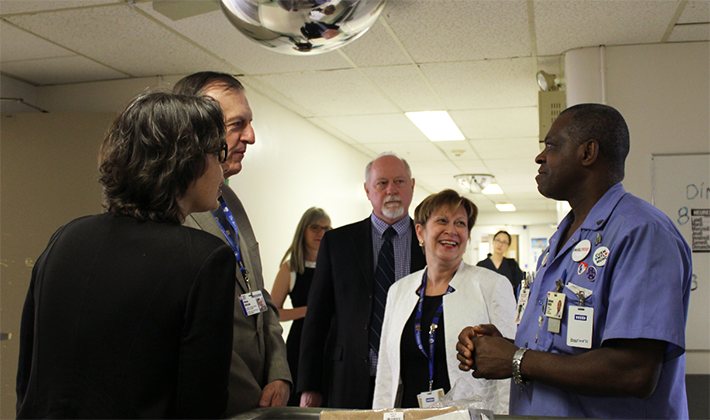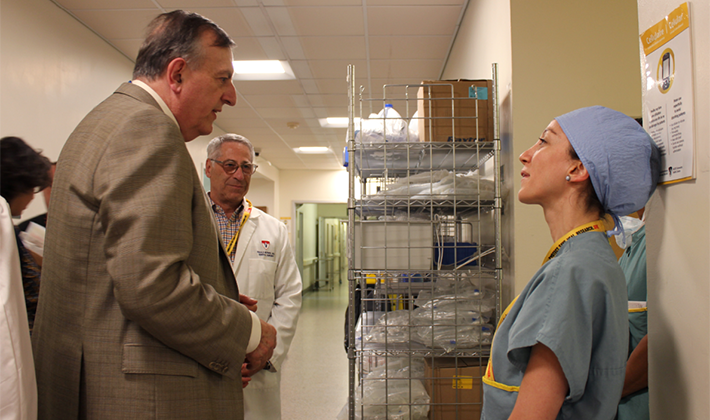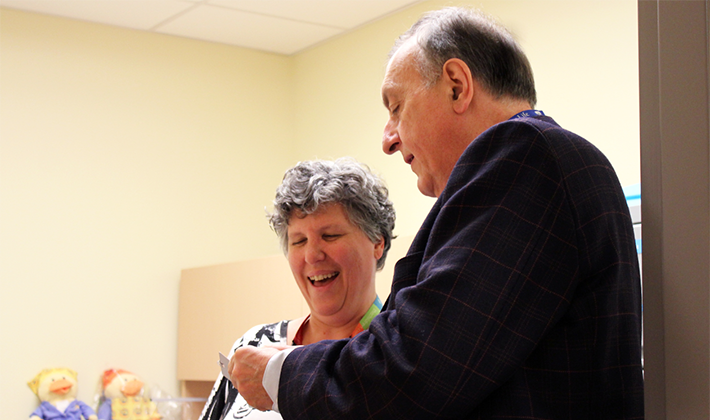Introducing your new President and Executive Director: Dr. Pierre Gfeller
My meeting with Dr. Pierre Gfeller is set for April 27th in a room at the McConnell Resource Centre on the Glen site, just a few days after the announcement of his appointment as President and Executive Director of the McGill University Health Centre (MUHC) and about a month before he takes office.
Before even getting started, he takes the time to chat with at least 30 people: doctors, researchers, student nurses and others. He asks each one their full name, inquires about what they do and asks if they like their work. "We’ll have a chance to talk again soon," he says to each one afterward, before settling in for his first interview as the new head of the MUHC.

THE MAN
GS: Tell us a little about yourself.
PG: I was born in Saint-Jean-sur-Richelieu and grew up in Montreal – in Rosemont. My father was a German-speaking Swiss immigrant who came to Canada in 1952 and my mother is a francophone Quebecer. I studied in Montreal and was lucky enough to be admitted to the Faculty of Medicine at McGill University in 1975. When I finished medical school in 1980, I decided to do my internship at l'Hôtel-Dieu de Montréal and at Sacré-Cœur and Sainte-Justine hospitals. That's where I met my wife, who is also a general practitioner. We have three children, now adults, two boys and a girl, who is also a doctor.
GS: What are you passionate about in life?
I am a people person and I like it when there's action!
PG: I am a people person and I like it when there's action! One of my great pleasures as a leader is to walk around and meet our staff, our patients, the doctors and the volunteers. I like to visit the units, the emergency rooms, the intensive care units, greet people and get to know them. I place a very high importance on an organization's overall climate. I am really happy to get another chance to work in both languages after having spent so many years in francophone environments.
GS: Is there a personal tidbit that you wish to share with us?
PG: I am very interested in the origin of surnames. This allows me to get to know people and the history of their family.
GS: What values are most important to you?
PG: First of all, I'm a humanist. That means that I value people above all else. If I had to live in another time period, I would have liked it to be the cradle of humanism: Florence during the Renaissance.
Secondly, respect stands out to me as an essential quality, whether it is between individuals, whoever they are, or groups and partners. I place a lot of emphasis on respect, because it's a sort of social lubricant that helps solve difficult problems. When respect prevails, you can disagree without being disagreeable.
Third, I believe in the importance of fairness. Some individuals and groups have greater needs than others, even if they can't speak for themselves, as in the case of mental health, for instance. We have to consider the real needs of people and the population as a whole in the organization of services and distribution of care.
Lastly, I believe in the pursuit of excellence and innovation, a particularly significant principle for an institution like the MUHC, whose mission is above all to offer tertiary and quaternary services, meaning specialized and ultra-specialized, to the people of Montreal and all of Quebec. It is so important that we do things right and that we innovate, not only in clinical services but in teaching, research and management.
THE DOCTOR
GS: What led you to practise medicine?
PG: I always wanted to be a doctor. When I was three years old, I was fascinated by the fact that our family doctor came to our house and had the power to heal.
GS: How did you make the transition from doctor to manager?
PG: I practised medicine for 15 years before I started to work part-time in administration. I served as department head and as the Chair of the Council of Physicians, Dentists and Pharmacists, but I always thought that as one studies to become a doctor, one should also study to become a manager. So I went back to school while I continued to practise, and simultaneously completed a Masters in Business Administration at the Université du Québec à Montréal (UQAM) and an Executive MBA at the Université de Paris-Dauphine. Over the years, I worked all over Quebec as a director general, medical examiner, and medical director, including being Medical Director for the Agence de la santé des Laurentides. In 2012, I became Executive Director of Sacré-Cœur Hospital in Montreal, and three years later, President and Executive Director of the CIUSSS du Nord-de-l'Île-de-Montréal, which is an organization roughly on par with the MUHC in terms of size, but whose mission is different in some respects.
GS: What is your vision of health care in Quebec?
PG: I know the Quebec network well, and in my opinion, the aim of our health and social services system should be to help individuals, families, groups and communities improve their health and well-being so they can lead active and rewarding lives.
In line with the thinking of Professor Henri Mintzberg, I strongly believe that the complex problems that healthcare institutions face can be more easily solved with the participation of four groups:
The "Community" (whether it be patients and their families, groups that represent the public or the Board of Directors); doctors ("Cure"); nurses and other professionals ("Care"); and managers ("Control").
In the coming years, that's the model that we will try to follow.

THE ADMINISTRATOR
TI'm in favour of a participative kind of management, where most of the decisions about care come from our staff, our professionals and our doctors
GS: How do you define yourself as a manager?
PG: I'm in favour of a participative kind of management, where most of the decisions about care come from our staff, our professionals and our doctors, who – because they are in daily contact with our patients and their families – better understand the reality on the ground.
I try to apply five basic principles of management on a daily basis:
- "Patients above all." In an organization like ours, everyone is important, but in the following order:
- The patients;
- The institution and its partner organizations. For the MUHC, that's McGill University and its Faculty of Medicine, and the foundations;
- Groups and teams;
- Individuals.
- Transparency. Within a big organization, stakeholders may have conflicting interests, so it's impossible to satisfy everyone all the time. The decision process has to take into account what people have to say, and once a decision is made it has to be explained to them.
- Collaboration. People who work in and around the organization have to remain engaged and work together to meet common goals.
- Partnership. An institution like the MUHC can't do everything on its own. It has to develop links with other organizations, groups and individuals in order to be able to concentrate on its mission and to ensure access to care and a better flow in the organization of services. Among our partners are the CIUSSSs (Centre intégré universitaire de santé et de services sociaux)) of the Greater Montreal region, McGill RUIS institutions, front-line family doctors, interest groups advocating for health care and the community as a whole.
- Achieving results. This means making sure that the resources we devote to care and services, teaching and research produce the desired results and meet the expectations of the Ministry with respect to the mutually agreed-upon annual management goals.
THE VISIONARY
GS: What are your ambitions for the MUHC?
I feel like the MUHC is ready for a new start
PG: I feel like the MUHC is ready for a new start. Despite having faced a number of difficulties over the last few years, the MUHC is an institution with a long and proud tradition, one that offers its patients specialized and highly specialized care of the highest calibre. Many of its sectors are internationally renowned. Many of our specialties, clinics and teaching and research activities are world class. Step by step, I hope we can restore trust between the various stakeholders, confidence in the future, and pride.
It seems clear to me that the MUHC has to keep its personality, its tradition and its history, but I do believe that we would gain by integrating a bit more into Montreal's and Quebec's health network and by showcasing our expertise in tertiary and quaternary care outside of the McGill network.
I also think that it makes sense to exchange more with our friends at the RUIS of the Université de Montréal – the CHUM and Sainte-Justine in particular – and with the other university health centres and RUIS, since our competition isn't really on the other side of the mountain; it's in Toronto, in Boston, at Oxford and Cambridge, and soon enough, in China.
I would like to make sure that the breeding ground is fertile enough so that innovation and excellence can not only continue, but can flourish at the MUHC, always with the long-term goal of continuing to provide the highest quality of care to the people of Montreal and Quebec, a high level of education to our students and world-class research.
I'm coming back to where I started and I feel so happy and enthusiastic about the idea of working with the MUHC community
GS: You left McGill University and by the same token, the MUHC hospitals at the end of your residency, all those years ago. Now that you're back, can we say you’ve come full circle?
PG: Absolutely. I'm coming back to where I started and I feel so happy and enthusiastic about the idea of working with the MUHC community to continue to offer the best possible quality of care to the people of Montreal and Quebec.

The first hundred days of Dr. Gfeller
June: meet with the Board of Directors, senior managers, representatives of McGill's Faculty of Medicine, representatives of patients and employees, medical department heads, the Research Institute leadership, the advisory councils (CPDP, CII, Multidisciplinary Council, Council of Non-Clinical Personnel, the foundations, etc.).
July: study the relevant data and exchanges with stakeholders.
August: draft a preliminary report, which will be presented to the Board of Directors and governing bodies in the fall.
